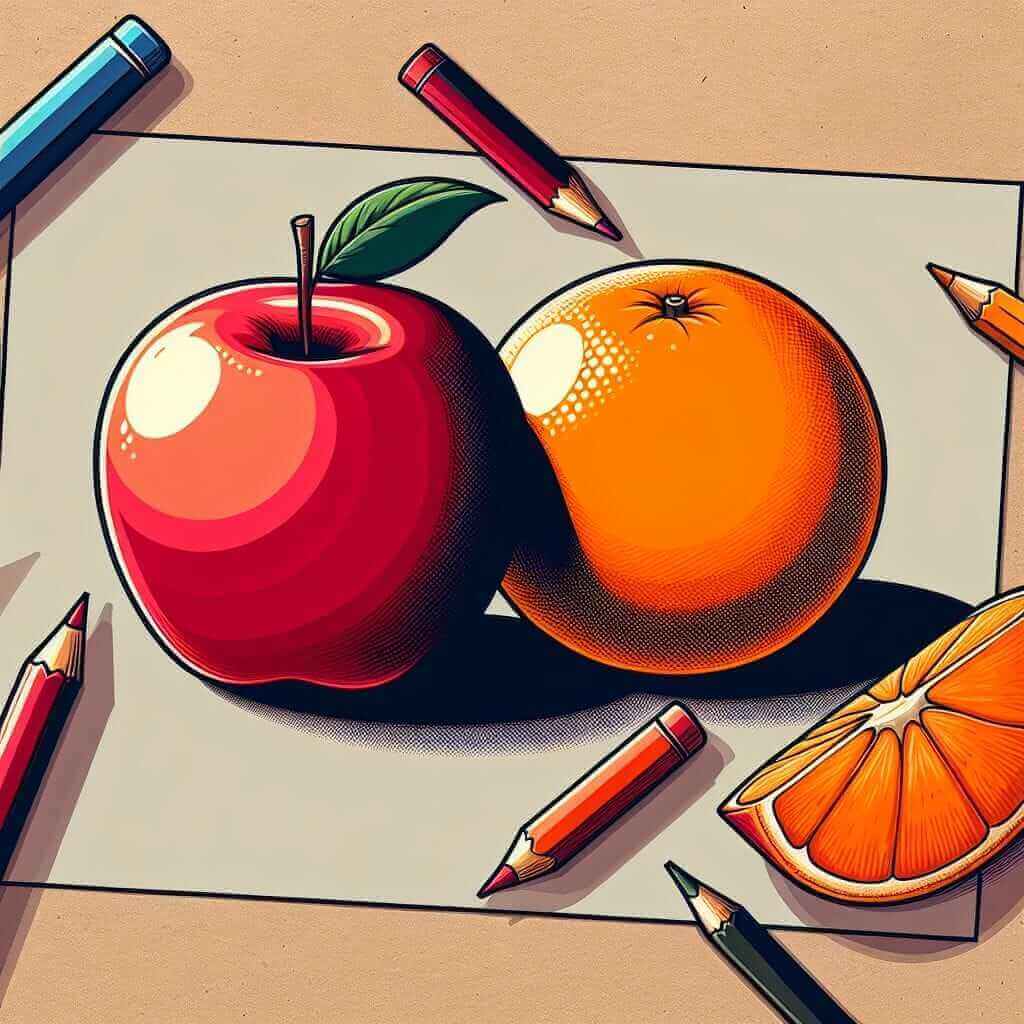The phrase “Comparing apples to oranges” is a common idiom in English, signifying the comparison of two things that are fundamentally different and thus cannot be compared in a meaningful way. This idiom is not only useful for everyday conversation but also holds significance in IELTS examination settings, particularly in the speaking and writing sections.
Synonyms:
- Chalk and cheese /tʃɔːk ænd tʃiːz/ (idiom, British) – Used to emphasize that two things are very different from each other.
- Example: “Comparing an online course to a traditional classroom is like comparing chalk and cheese.”
- Night and day /nʌɪt ænd deɪ/ (idiom) – Used to signify two things that are completely different.
- Example: “Their opinions on climate change are like night and day.”
- Apples and pears /ˈæp.əlz ænd pɛrz/ (idiom) – A British cockney rhyming slang term meaning ‘stairs’.
- Example: “You can’t compare work and vacation; it’s like apples and pears.”
- Worlds apart /wɜrldz əˈpɑrt/ (idiom) – Things that are very different.
- Example: “The new and old versions of the software are worlds apart.”
- Polar opposites /ˈpoʊ.lər ˈɑː.pə.zɪt/ (idiom) – Totally different or opposite in nature.
- Example: “Their views on education are polar opposites.”
Understanding the Idiom
Definition and Pronunciation
“Comparing apples to oranges” – /kəmˈpɛrɪŋ ˈæpəlz tu ˈɔːrɪndʒɪz/
The idiom conveys that comparing two unlike things is a futile or illogical activity. In the context of IELTS, this phrase can be particularly handy when discussing different topics or perspectives in the speaking or writing sections.
Examples in Different Contexts
-
Daily Conversation:
- “You can’t compare her cooking to a professional chef’s cooking; it’s like comparing apples to oranges.”
-
Academic Discussion:
- “Comparing the economic policies of two countries with vastly different resources is like comparing apples to oranges.”
-
Workplace Communication:
- “Judging the performance of an intern against a senior executive is comparing apples to oranges.”
-
IELTS Speaking:
- “When discussing hobbies, I believe comparing reading books to playing sports is like comparing apples to oranges.”
-
IELTS Writing:
- “In Task 2, when comparing traditional and online education, it’s important to recognize that each has unique attributes, making direct comparison akin to comparing apples to oranges.”
Importance in IELTS
Popularity in IELTS Test
This idiom can frequently be employed in the IELTS exam, particularly in the writing and speaking sections, to elaborate on points more vividly and indicate a nuanced understanding of English idioms.
Sample Writing Task 2 Use
Question: Some people believe that public libraries are no longer necessary due to the availability of digital information. To what extent do you agree or disagree?
Answer:
- “While it is true that digital information is rapidly accessible, comparing the role of public libraries to digital platforms is like comparing apples to oranges. Public libraries offer a community space and serve as a hub for local events, which digital platforms cannot replicate.”
Sample Speaking Part 3 Use
Question: Do you think that technology has changed the way we learn?
Answer:
- “Absolutely, but I feel that comparing traditional learning methods to technological advancements is like comparing apples to oranges. Each has its distinct advantages and limitations.”

Combining with Other Phrases
-
Square Peg in a Round Hole: Used to indicate that something does not fit or match well.
- “Assigning a designer to a coding job is like fitting a square peg in a round hole, akin to comparing apples to oranges.”
-
Fish Out of Water: Used when someone is in an unfamiliar situation.
- “Asking him to compare literature to calculus makes him feel like a fish out of water, much like comparing apples to oranges.”
-
Worlds Apart: Indicates significant differences.
- “Their leadership styles are worlds apart, much like comparing apples to oranges.”
Related Idioms and Usage
-
Chalk and cheese:
- “Your proposal and mine are as different as chalk and cheese.”
-
Night and Day:
- “The progress of these two students is as different as night and day.”
-
Apples and pears:
- “Trying to link the corporate sector’s rules with government regulations is like apples and pears.”
-
Worlds apart:
- “The old and new management styles are worlds apart.”
-
Polar opposites:
- “Their beliefs on the topic are polar opposites.”
Conclusion
The idiom “Comparing apples to oranges” is an invaluable expression that can be utilized across various contexts, especially in the IELTS exam. Its proper usage not only showcases a nuanced understanding of the English language but also enriches your responses, making them more compelling and clear. By familiarizing yourself with this idiom and similar expressions, you enhance your ability to express complex comparative ideas effectively.